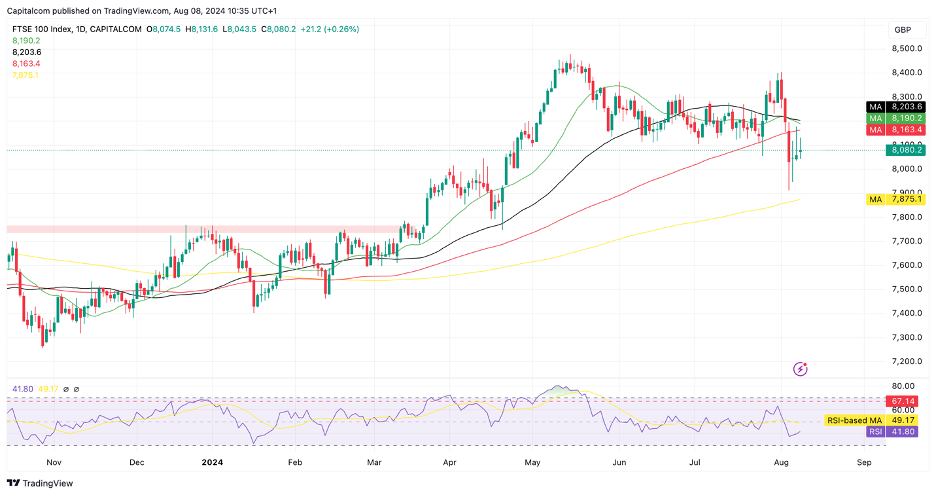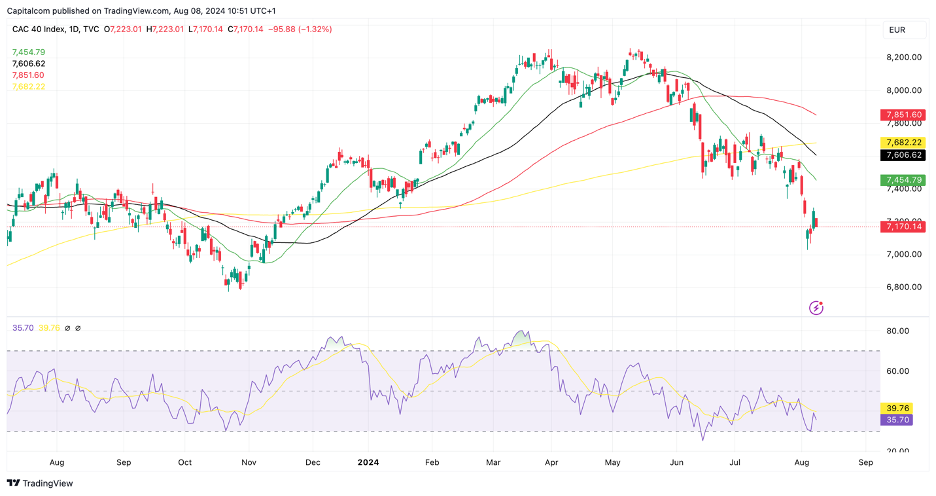A choppy week of trading continues in markets. The lack of significant data on the calendar this week has left traders looking for direction elsewhere, so far relying on sentiment. Tuesday and Wednesday saw attempted rebounds across global stock markets but the lack of momentum suggests that traders aren’t ready to become buyers again just yet. There is still a lot of uncertainty to be cleared, and overbought conditions have only just started to be reset.
The focus will likely shift to the economic data being released next week and how it may shed further light on the state of the UK and US economy. The latter, specifically, will be of increased interest after the Federal Reserve decided to leave rates unchanged in July, a move that markets have deemed as a mistake. The weaker jobs data triggered this feeling of impending economic doom, leading markets to price in a 50-basis point cut in September, and even an out-of-cycle cut that is highly unlikely to take place. The July US inflation reading on Wednesday will likely be the main focus and we could see a resurgence of volatility on the back of it. UK jobs and UK inflation data will also be released next week.
Meanwhile, the stock market is left struggling to recover. Months of exuberance in stocks, specifically the tech sector, has started to be unwound, threatening the continuation of the long-term bullish trend. Despite the market reaction following the weaker US jobs reading, the data isn’t yet screaming recession, even if the Fed has held rates elevated for too long. We could still see some appetite for recovery before things get worse, if they do. A soft landing is still on the cards and traders may become optimistic once again when the Fed starts cutting rates – supposedly in September – especially if the US economy continues to show resilience.
From a technical perspective, European stocks are slightly better positioned to recover some bullish appetite when compared to the US. The DAX 40 and the FTSE 100 are holding on to mild gains following the current recovery attempt. The UK index is showing better resilience as the price remains a good way above its 200-day SMA (7,875) which cannot be said for most other indices. The short-term bias seems to be recovering to the upside, but further volatility cannot be ruled out. A close below the 8,000 could open up the space for further bearishness.
FTSE 100 daily chart
Past performance is not a reliable indicator of future results.
Meanwhile, the STOXX 600 is finding it harder to reverse the weakness. The index is down 1% on Thursday morning as a resurgence in weakness in the stock sector during the Asian session weighs on appetite. So far, the gains from the previous session have been wiped out and price has dropped below the 200-day SMA once again. The short-term bias remains geared to the downside with a break above 500 needed to reset the momentum.
Similarly, the CAC 40 is struggling to shake off the negative sentiment. The French index is facing a slightly tougher outlook as the weakness following the political turmoil is still weighing on appetite. As opposed to most other indices which saw the selloff originate close to all-time highs, the CAC 40 had already been facing a bearish outlook when the latest pullback took place – the index is down over 14% since May. A move higher towards the 7,600 mark could reset some of the weakness and change the outlook for the index.
CAC 40 daily chart
Past performance is not a reliable indicator of future results.
Which stock should you buy in your very next trade?
With valuations skyrocketing in 2024, many investors are uneasy putting more money into stocks. Unsure where to invest next? Get access to our proven portfolios and discover high-potential opportunities.
In 2024 alone, ProPicks AI identified 2 stocks that surged over 150%, 4 additional stocks that leaped over 30%, and 3 more that climbed over 25%. That's an impressive track record.
With portfolios tailored for Dow stocks, S&P stocks, Tech stocks, and Mid Cap stocks, you can explore various wealth-building strategies.


